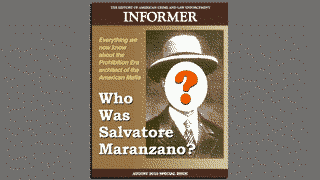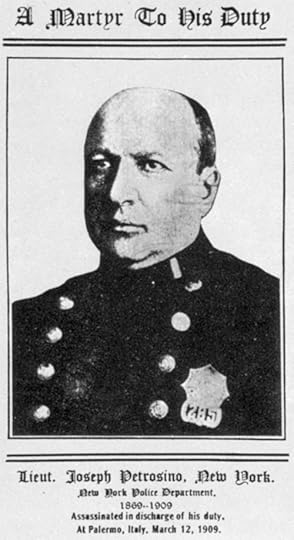Thomas Hunt's Blog
September 27, 2021
California mafiosi

California-related articles: Trail of blood - Barnett Baff killing linked Corleone, East Harlem and Los Angeles; Sam Streva and the 'San Pedro gang'; Was DeJohn a victim of Cheese War?; Golden State often unfriendly to transplanted mobsters; San Francisco boss Lanza held key role with Colorado's Mafia; New Orleans connection to San Francisco Mafia.
Other articles: Reinhold Engel's robbery gang; Another, other Gentile family; Police on postage.
Contributors: J. Michael Niotta PhD, Justin Cascio, Thomas Hunt, Michael O'Haire, Lennert van 't Riet, Jeffery King.
Visit Informer website for more information.
August 20, 2019
Why Maranzano? Why now?

Watch Youtube video.
Preview or purchase this issue:
- Print and PDF from MagCloud
- E-book from Amazon
For more information, visit Informer's website.
July 21, 2019
E-book on Mafia boss of bosses Maranzano
See mafiahistory.us/informer/ for more information on the journal.
The Maranzano issue features twelve articles and columns (written by Thomas Hunt, Lennert van`t Riet, David Critchley and Richard N. Warner), more than three dozen images and maps, as well as source citations.
Item description from Amazon:
"Everything we now know about the Prohibition Era architect of the American Mafia.
A long lost photograph of Salvatore Maranzano is discovered. Informer marks that occasion by dedicating an entire special issue to the one-time American Mafia "Boss of Bosses," tackling such questions as:
- What recent discoveries have been made?
- Why was Maranzano important in U.S. Mafia history?
- What did Maranzano certainly NOT look like?
- What was Maranzano up to in Dutchess County, New York?
- What was revealed about Maranzano by those who knew him?
- Where were the significant locations in his life and career?
- When did Maranzano-related events occur?
- How has he been depicted in motion pictures?
- Why did he hire Vincent "Mad Dog" Coll for the planned murder of "Lucky Luciano"?
- Did Maranzano become a U.S. citizen?
- What do we know about his time in Sicily?
- Was there really a post-Maranzano purge in the Mafia?"
July 2, 2017
Blood-soaked history of the West Side docks
 Dock Boss: Eddie McGrath and the West Side Waterfront by Neil G. Clark
Dock Boss: Eddie McGrath and the West Side Waterfront by Neil G. ClarkMy rating: 5 of 5 stars
In his first book-length project, Neil Clark takes aim at the mobsters of New York's West Side waterfront and scores a hit.
His selection of subject, puts Clark in the footsteps of giants. An early account of waterfront corruption and racketeering by Malcolm Johnson of the New York Sun won the 1949 Pulitzer Prize for local reporting. On the Waterfont, a fictional film about gang rule along the wharves, won a trunkload of 1954 Academy Awards. More recently, historian Nathan Ward revisited the Hudson River docks for his 2010 book, Dark Harbor, examining Malcolm Johnson's groundbreaking effort to bring waterfront organized crime to light.
While much of the material in Dock Boss is familiar, Clark expands on earlier work with information drawn from court and prison files, FBI archives and other state and federal agency records. He delivers an informative and intriguing history. The Greater Toronto Area resident strays just a bit from the beaten path and approaches the subject through the life and career of a real-world "Johnny Friendly," Eddie McGrath.
McGrath's life story is a virtual Who's Who of Gotham outlaws. On his way to boss status, he benefited from alliances with such figures as "Big Joe" Butler, "Peck" Hughes, "Red" McCrossin, "Farmer" Sullivan, Andrew "Squint" Sheridan, John "Cockeye" Dunn and James "Ding-Dong" Bell. The résumés of his associates and his underworld rivals featured service with some of New York's most notorious gang chieftains, including Dutch Schultz, "Legs" Diamond, "Mag Dog" Coll and Owney Madden. Working relationships with Joey Rao, Vincent "Jimmy Blue Eyes" Alo and Giuseppe "Joe Adonis" Doto, eventually brought McGrath into contact with syndicate bosses Meyer Lansky and Frank Costello.
While exploring in detail the bloody gang wars, assassinations and brutalities of McGrath's career, Clark takes a bit of time to explain the unique features of New York City's docks and the rackets used by gangsters, union leaders and politicians to profit from them.
This reviewer can manage only a few minor complaints about Clark's work:
- Chapters are unusually short and sometimes break up logical units of the story. While I offer it as a criticism, it is likely that many readers will appreciate the short chapters.
- There are occasional typos and a bit of indecision over whether to use U.S.- or Canada-preferred spellings for some terms.
- The author may have been overly accepting of earlier histories. Some small Dock Boss flaws can be traced to Malcolm Johnson's work and reports based on Johnson's articles.
- Dock Boss but does not include source citations for statements of fact in the text. This seems due to publisher policy. While it may be mildly frustrating for researchers, it should not be interpreted as a lack of documentary support. Clark provides an extensive bibliography and proves that he has command of the available sources in this subject area.
[Note: Author provided a review copy of the ebook.]
View all my reviews
April 25, 2017
Liberty Place monument removed
As readers of Deep Water: Joseph P. Macheca and the Birth of the American Mafia are aware, the battle was an important moment in Macheca's life. In the conflict between the conservative Democratic "White League" and the Republican Reconstruction government of Louisiana, Macheca commanded a White League-aligned force of immigrant Sicilians.
The monument was erected in 1891 (the same year that Macheca and ten other men were killed by a New Orleans lynch mob). Originally dedicated to the White League members who lost their lives in the fight, the monument later became a symbol for white supremacists and a cause of decades of controversy.
Read more on the Writers of Wrongs website.

March 12, 2017
The Writers of Wrongs
"The Writers of Wrongs" is a new blog formed by a number of crime history authors. Posts relate to authors' projects, experiences and research. At this time, the blog includes posts from Christian Cipollini, Patrick Downey, Thomas Hunt and Ellen Poulsen. Additional authors will be added soon.
Click here to visit The Writers of Wrongs.
108 years ago: Petrosino is slain
On this date in 1909, Lieutenant Joseph Petrosino is assassinated while on assignment for the New York Police Department in Palermo, Sicily. He is the only NYPD officer to be killed in the line of duty while on foreign soil.
Though he was traveling under an assumed identity, New York newspapers and the Sicilian-Italian underworld learned of his trip across the Atlantic before he reached Europe. For years, Petrosino had hounded organized criminals in New York's Little Italy neighborhoods. Many were imprisoned or deported due to his efforts. A network of Mafiosi, apparently linked with the Morello Crime Family of New York, is believed to have arranged the shooting death of Petrosino at Palermo's Piazza Marina on the evening of March 12. Police officials in Italy were certain of the identities of the plotters and participants in the assassination, but none were successfully prosecuted.
Officially, Petrosino's mission was to gather Italian criminal records of outlaws who had made their way to New York. The records would allow recently arrived outlaws to be deported from the U.S. Petrosino's actions suggested that he also intended to establish NYPD informants within the criminal societies of southern Italy and Sicily. The first leader of the NYPD Italian Squad (which also spawned the NYPD Bomb Squad), Petrosino had recently been named to command a privately financed, undercover service within the police department. The transatlantic trip, which took him from his wife and young daughter, was his first major task in that new role.
Known for employing tenacity and toughness in numerous successful battles with lawbreakers and underworld organizations, Petrosino became a hero, as well as an important role model, for the quickly growing Italian-American community.
January 6, 2017
Book giveaway concludes
Winners, selected at random by Goodreads, were located in northern Illinois; Hillsborough County, Florida; and Hocking County, Ohio.
Thanks to all who entered and to Goodreads for hosting the promotion.
January 5, 2017
1939: Sberna goes to The Chair
As the son of a fugitive wanted for orchestrating a series of bloody anarchist-terrorist bombings and the in-law of a family of Mafia leaders, could Sberna possibly have been handled objectively by authorities?
' Wrongly Executed? ' provides the details and historical background of the Sberna case. The story is a complex and controversial one, involving celebrity attorneys, underworld bosses, violent political radicals, media giants and ruthless establishment figures, all set in a period in which Americans sought stability and government-imposed order after years of political upheaval, economic depression and Prohibition Era lawlessness.

Click to visit the website.
December 16, 2016
Chance to win signed copy of 'Wrongly Executed?'

Enter the Giveaway



